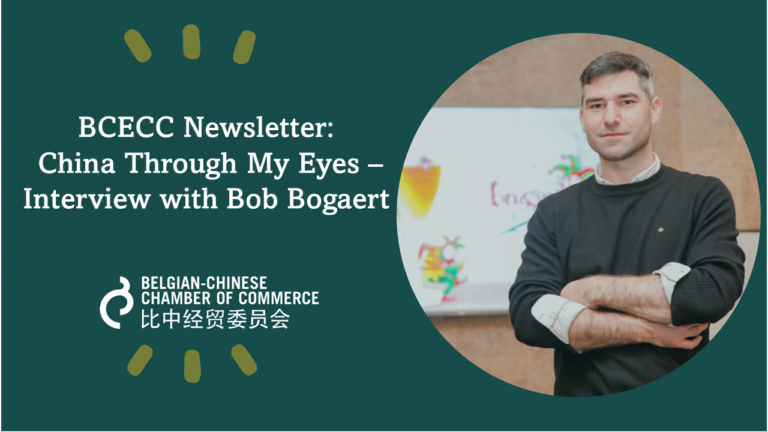As part of our new ‘China through my eyes’ series, we interview Belgians who stayed in China during the past years.
1. Could you briefly introduce yourself, and in particular how you ended up working in China?
My first visit to China was in 2007, right before the Beijing Olympics. It was an eye-opener. Even though I had by then studied Sinology in Ghent for a few years, I was still impressed with the kindness of the people, the vitality of the economy, and the speed of progress. It made me all the more determined. I went back to Belgium to finish my studies, completed an extra Master’s in Economics, gained a scholarship to go study in Shanghai, and in 2013 I signed at Tencent.
2. Could you describe your experience working at this big Chinese tech company as a young European and why you left that fast-growing company in the early years of mobile gaming, WeChat, and other features?
The Tencent years were an amazing experience, and they gave me some friends for life. I still have a lot of love for the company. I joined when QQ was more important than Wechat, and we were making a strategic pivot from desktop to mobile gaming. For many European mobile game studios, I was the first Tencent representative to make contact and set foot in the studio. The dynamic environment, camaraderie, and sense of mission are things I try to replicate wherever I go. I finally left because I saw a few of my colleagues compromise their health to step up the ladder. From what I gather, things have improved a lot since then, but at that point, I had a good offer elsewhere and it became time for me to move on.
3. Currently you are based in Shanghai and working as a general manager in China for Brewery De Halve Maan. How is the reputation of Belgian beer in China?
Thanks to the work of fellow breweries in the last two decades, Belgian beer has a very good reputation in China, especially in terms of authenticity and quality. About a decade ago, you could find almost any Belgian beer if you knew the right places. Things have consolidated quite a bit since. Lately, the novelty of craft IPAs is wearing off, and I can feel that Chinese consumers are searching for quality again. Because De Halve Maan has a unique story, having completed the 3.2km long underground beer pipeline, and because we have 3 amazing brands, I think China is a place where we can do very well. Especially Straffe Hendrik is gaining popularity year by year.
4. How did you spend the severe lockdown in Shanghai in 2022 and did this have any impact on your company’s business? Were there other ways in which the pandemic influenced you?
By March 2022, I could feel the lockdown coming in Shanghai and went to live in Shenzhen just in time. The Belgians who stayed and went through it all are true heroes. For our business, the Shanghai lockdown meant there was close to no revenue in Shanghai in April and May 2022. This was of course a significant setback. Another major influence of the pandemic were the travel restrictions. A lot of planned visits were canceled because of Covid. In 2022, I haven’t gotten the chance to visit some of our customers, such as Brussels Beer Garden in Wuhan, or Chicon in Nanchang because of constant restrictions. Once these restrictions within China are lifted, I will spend most of my time on the road again.

5. After you went back to Belgium last year in October, you came back to China, went into quarantine, then saw China catch a giant Covid wave, and then suddenly lifting all restrictions and opening up. How did you experience that?
I went into quarantine well-prepared for what was coming. We have some very helpful WeChat groups in which Belgians in China share their experiences. So, I packed some extra fresh clothes and comfort foods. With a laptop and an internet connection, you can make any place into a makeshift office. In the evenings I was lucky to have a lot of long calls with my family and my little daughter. Just a few weeks later, it looked like everyone got Covid all at once. Suddenly it almost became fashionable to just get infected and get it over with. I had expected the opening up to be taking place in March, but I’m really glad we did it earlier than that. It’s been a tough two years, and now in February we can all feel business picking up again.
6. You live in Shanghai and Shenzhen, two of the most vibrant cities in China and in the world. What’s it like to live in these cities, and do you see any differences due to the current economic challenges and covid-restrictions?
The Shanghai lockdown was an absolute tragedy, and I was lucky to escape it just in time. When I visited just after the lockdown, I found the city unrecognizable. The life and vitality were largely gone. I’m sure that the city will fully revive in the coming months. Shenzhen was one of the cities with the most strict regulations in China, requiring 24h green codes most of the time, but that also kept it quite safe from major city-wide lockdowns. We suffered a lot of small inconveniences in order to ward off larger lockdowns. It also means that except for constant testing, life in Shenzhen mostly proceeds as normal. The Chinese real estate crisis is real, but its effects aren’t yet visible in daily life.
7. How do you see your future in China? Do you see yourself living in China for the long term or do you plan to come back to Belgium one day?
My plan is to stay in China. Many friends go back to Belgium once their kids reach a certain age. They have more confidence in the Belgian educational system. I understand and support those decisions. Personally, I am more optimistic about the progress in China’s educational reforms, and I think by the time my daughter reaches the age to choose a school, she will have plenty of good options that might not exist today.
8. Are you optimistic or pessimistic about doing business in China and what would you recommend to other Belgian companies and entrepreneurs?
I am optimistic to a fault, mostly because I try to never forget the long-term view, and I think I have a fairly good understanding of the Chinese character. The sensational things that make the evening news influence our feelings and generally make us more pessimistic. I’m not denying there are some worrisome developments, but I try to give these stories the appropriate perspective and weight of importance. The fact that science, technology, and entrepreneurialism create wealth for societies is almost assured. The Chinese middle class and its purchasing power will keep on growing. Financial crises, pandemics, recessions, or other challenges can slow progress down for a few years, but from a long-term viewpoint, these are just blips in a great story of economic development and progress. My recommendation would be to not be distracted by the story of the moment and keep thinking long-term. We need Belgian businesses and new generations of entrepreneurs to engage with China and China still has a lot to offer.
